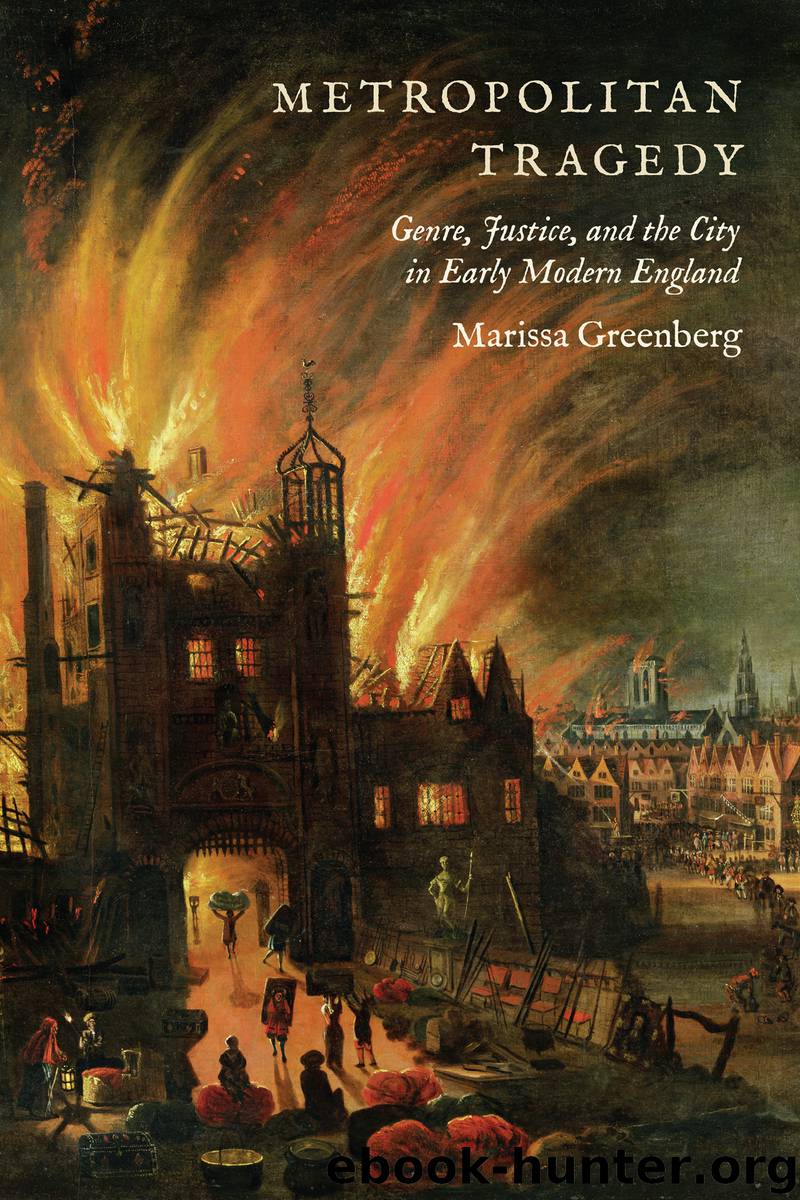Metropolitan Tragedy by Marissa Greenberg

Author:Marissa Greenberg
Language: eng
Format: epub
ISBN: 978-1-4426-1772-8
Publisher: University of Toronto Press
Published: 2015-03-22T16:00:00+00:00
In this passage, which one scholar calls “some of the strangest lines in Paradise Lost,” Milton represents Paradise and Hell in terms of the distinct sensorial experiences of the city and the country, paying particular attention to touch, smell, and sight.31 The bodily, tactile experience of Hell is reminiscent of the city in that both are places of imprisonment. City-dwellers are “pent” “in,” narrowly confined by “houses thick,” and oppressed by noxious “air.” This is solitary confinement: the city-dweller is “one,” alone among the “populous city.” The olfactory experience of this urban multitude, which lives and works in close quarters, is noisome. In fact, according to Ken Hiltner, this passage alludes to the “serious problem” of air pollution in seventeenth-century London.32 The smoke and fumes emitted by sea coal produced a troubling visual experience as well. In addition to destroying the health of vegetation, livestock, game, and people in and around London, air pollution was blamed for degraded buildings and foreshortened vistas, which transformed the well-lit cityscape into “darkness visible” (PL 1.63). Milton juxtaposes this sensibly oppressive metropolis to an idyllic countryside full of sensorial pleasures. Having “Forth issu[ed]” from his urban prison, the city-dweller rambles “Among the pleasant villages and farms / Adjoined,” where he “conceives delight” from each “smell,” “each … sight,” and “each … sound.” The reference to sound is striking because, whereas the passage details what the city-dweller meets, smells, and sees in the country (e.g., villages, farms, fields, cattle, and their by-products), it leaves to inference what he hears. The implication is that the country offers soothing sounds, its quiet disturbed only by the gentle whishing of the breeze through the grass, the lowing of cows, or the clatter of a milkmaid’s pail. By contrast, the city is understood to be a place of loud, offensive, and oppressive noises. Indeed, in the early modern metropolis, the sounds of human discourse, activity, and industry became increasingly inescapable.
The profusion of noise in seventeenth-century London informed broader cultural shifts in what it meant to hear rightly. Changes in the urban soundscape compounded what Lawrence Manley describes as an “ethical innovation … of place,” in which “a mobile inner paradise of expanding personal powers and responsibilities” replaced “traditional forms of communal discipline.”33 Londoners increasingly expected to hear the call to virtue and civility as a still small voice, such as Elijah hears in I Kings 19:12, rather than as inspired preachers and pan-pounding neighbours. As urban upheaval challenged right hearing, Milton and others bypassed the ear altogether and advocated hearing directly with the heart. In Paradise Lost, for instance, the Father asserts: “And I will place within them as a guide / My umpire conscience, whom if they will hear” will “safe arrive” (PL 3.194–5, 197). The “place” of right hearing is “within” Londoners, not in the city’s streets or at its pulpits. With the Word of God thus resounding in their hearts, Londoners might “conuert in life,” as Crooke writes, and at the end of days, hear divine music in the City of Heaven.
Download
This site does not store any files on its server. We only index and link to content provided by other sites. Please contact the content providers to delete copyright contents if any and email us, we'll remove relevant links or contents immediately.
| Ancient & Classical | Arthurian Romance |
| Beat Generation | Feminist |
| Gothic & Romantic | LGBT |
| Medieval | Modern |
| Modernism | Postmodernism |
| Renaissance | Shakespeare |
| Surrealism | Victorian |
4 3 2 1: A Novel by Paul Auster(12358)
The handmaid's tale by Margaret Atwood(7734)
Giovanni's Room by James Baldwin(7307)
Asking the Right Questions: A Guide to Critical Thinking by M. Neil Browne & Stuart M. Keeley(5745)
Big Magic: Creative Living Beyond Fear by Elizabeth Gilbert(5731)
Ego Is the Enemy by Ryan Holiday(5398)
The Body: A Guide for Occupants by Bill Bryson(5067)
On Writing A Memoir of the Craft by Stephen King(4921)
Ken Follett - World without end by Ken Follett(4711)
Adulting by Kelly Williams Brown(4556)
Bluets by Maggie Nelson(4536)
Eat That Frog! by Brian Tracy(4503)
Guilty Pleasures by Laurell K Hamilton(4428)
The Poetry of Pablo Neruda by Pablo Neruda(4083)
Alive: The Story of the Andes Survivors by Piers Paul Read(4013)
White Noise - A Novel by Don DeLillo(3993)
Fingerprints of the Gods by Graham Hancock(3980)
The Book of Joy by Dalai Lama(3963)
The Bookshop by Penelope Fitzgerald(3829)
